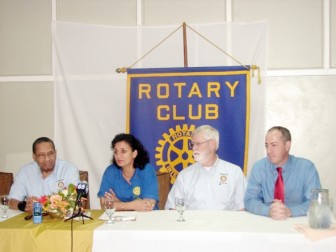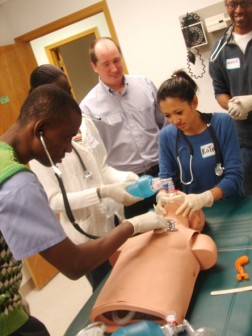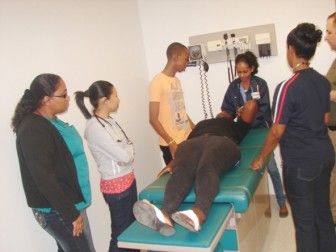Guyanese requiring emergency health treatment can soon expect improved ambulatory care as more than two dozen healthcare workers are being trained as Emergency Medical Technicians (EMTs) trainers.
The Rotary Club of Georgetown, in partnership with rotary clubs in Boston Massachusetts, in the US, sponsored the one-week intensive “ Train a Trainer” programme that will see medical personnel selected by the Ministry of Health equip themselves with needed EMT training so that they can train other selectees.

The US$46,500 Emergency Medical Research Capacity Project is being executed following a needs assessment that was carried out in 2009.
Emergency Education Consultant Dr. Timothy Redding, a rotarian from the United States, told a news conference held by the Rotary Club of Georgetown at the Georgetown Club, that equipment brought to Guyana for the training programme would remain in Guyana for permanent training purposes, since the objective is to always have skilled EMTs at hospitals throughout Guyana. Participants were given textbooks, PowerPoint lectures and other educational material prior to the classes, so that when the foreign trainers began their work it would be focused mainly on reinforcing theoretical concepts and practicals.

Rotary spokesman Kit Nascimento described the ambulatory infrastructure here as “poor” but said training of personnel would still be important, even if there are better ambulances, since human resources are critical.
Training is being conducted at the Project Dawn Centre, at Liliendaal, where foreign trainers have been conducting crash theoretical and practical sessions, such as the handling and diagnosing of emergency patients.
When Stabroek News visited the Centre yesterday, there were also simulated briefing sessions with patients and the emergency diagnosis of patients.
During a role-play, trainer Carl Omeacsk demonstrated to local participants how to examine the four quadrants of the abdomen to ascertain if there is pain that could possibly be associated with internal bleeding. Using equipment brought by the rotarians, students carried out a number of basic life support skills they would need, especially when transporting patients in an ambulance.

Prospective EMT trainer Kurt Embrack, who is attached to the GPHC, told this newspaper that the classes were very beneficial to him and helped him to grasp a lot of the medical concepts required through practical means. He added that he is assured that when it is his turn to teach other local EMTs, he will do an excellent job.
After the training is completed, the participants are expected to train their fellow Guyanese in being efficient and effective first responders. The foreign team is due to return to Guyana on follow-up visits to assess the performance and effectiveness of the Guyanese trainers.




